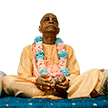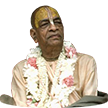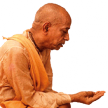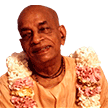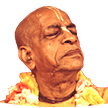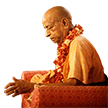Mukti - an essential subject: Difference between revisions
Nayanranjani (talk | contribs) (Created page with "Category:Essential Subjects <!----------------------- edit below this line -----------------------> <!------------------------ begin introduction text below ------------...") |
(Vanibot #0041: Moves Choose Another box to the end) |
||
| Line 2: | Line 2: | ||
<!----------------------- edit below this line -----------------------> | <!----------------------- edit below this line -----------------------> | ||
<!------------------------ begin introduction text below ------------------------> | <!------------------------ begin introduction text below ------------------------> | ||
Mukti is to be reinstated to one's original spiritual status after giving up the material conception of life. This can be achieved when one realises that he is not this body, but is the spirit soul within, and accordingly takes to gaining spiritual knowledge. Human life is meant specifically for oneself to qualify for this spiritual liberty. However, just gaining mukti is not the ultimate goal of life because there are spiritual planets much higher than where one may merge into after attaining liberation. Shaastras state that the ultimate destination for us is to go back to Lord Krishna's abode (from where one would never fall). | |||
Srila Prabhupada's books, lectures, conversations and letters offer a comprehensive presentation of this essential subject as seen in the Vaniquotes '''[[Vaniquotes:Category:Mukti|Mukti]]''' category. An introduction from his books is given below in the following | Srila Prabhupada's books, lectures, conversations and letters offer a comprehensive presentation of this essential subject as seen in the Vaniquotes '''[[Vaniquotes:Category:Mukti|Mukti]]''' category. An introduction from his books is given below in the following 8 quotes. | ||
<!-------- end introduction text and don't touch next three lines ---------> | <!-------- end introduction text and don't touch next three lines ---------> | ||
---- | ---- | ||
== Quotes from Srila Prabhupada's books == | == Quotes from Srila Prabhupada's books == | ||
<!----------------- edit quote boxes below this line -----------------> | <!----------------- edit quote boxes below this line -----------------> | ||
{{VaniQuotebox| | {{VaniQuotebox|A pure devotee never begs the Lord for material happiness in the shape of riches, followers, a good wife or even mukti. The Lord promises, however, yoga-ksemam vahamy aham: "I voluntarily bring everything necessary for My service"|"O almighty Lord, I have no desire to accumulate wealth, nor do I desire beautiful women, nor do I want any number of followers. I only want Your causeless devotional service birth after birth." A pure devotee never begs the Lord for material happiness in the shape of riches, followers, a good wife or even mukti. The Lord promises, however, yoga-kṣemaṁ vahāmy aham: (BG 9.22) "I voluntarily bring everything necessary for My service." '''(Śrīmad-Bhāgavatam 6.18.75)'''}} | ||
{{VaniQuotebox| | {{VaniQuotebox|A pure devotee, however, does not accept any kind of mukti. He wants only to serve Krsna in a transcendental relationship. This is the perfectional stage of spiritual life|A pure devotee, however, does not accept any kind of mukti. He wants only to serve Kṛṣṇa in a transcendental relationship. This is the perfectional stage of spiritual life. Māyāvādī philosophers desire to merge into the existence of the Brahman effulgence, although this aspect of liberation is always neglected by devotees. '''(Caitanya-caritāmṛta, Ādi-līlā 8.19)'''}} | ||
{{VaniQuotebox| | {{VaniQuotebox|Actually a mukta, or liberated soul, is he who understands his constitutional position as an eternal servant of the Lord. Such liberated souls engage with faith and devotion in the service of the Lord, and they are called krsna-bhaktas|When one is liberated, he theoretically understands that the living entity is not composed of material elements but is spirit soul, distinct from matter. Simply by theoretically understanding this doctrine, one can be called liberated, but actually a mukta, or liberated soul, is he who understands his constitutional position as an eternal servant of the Lord. Such liberated souls engage with faith and devotion in the service of the Lord, and they are called kṛṣṇa-bhaktas, or Kṛṣṇa conscious persons. '''(Teachings of Lord Caitanya, Chapter 1)'''}} | ||
{{VaniQuotebox| | {{VaniQuotebox|All who desire some material advancement through bhukti, mukti or siddhi are punishable in due course of time, and they return to material activities|All who desire some material advancement through bhukti, mukti or siddhi are punishable in due course of time, and they return to material activities. Prahlāda Mahārāja rejected them all; he simply wanted to engage as an apprentice under the guidance of a pure devotee. '''(Śrīmad-Bhāgavatam 7.9.24)'''}} | ||
{{VaniQuotebox| | {{VaniQuotebox|The Lord can award anyone and everyone liberation (mukti) from the bondage of material existence, yet He rarely awards the privilege of love of Godhead|The Lord can award anyone and everyone liberation (mukti) from the bondage of material existence, yet He rarely awards the privilege of love of Godhead, as confirmed by Nārada (muktiṁ dadhāti karhicit sma na bhakti-yogam). This transcendental devotional service of the Lord is so wonderful that the occupation keeps the deserving devotee always rapt in psychological activities, without deviation from the absolute touch. Thus love of Godhead, developed in the heart of the devotee, is a great mystery. '''(Śrīmad-Bhāgavatam 2.9.35)'''}} | ||
{{VaniQuotebox| | {{VaniQuotebox|The Mayavadi philosophers' standard of mukti is very insignificant for a devotee, for by devotional service even the Supreme Personality of Godhead becomes subordinate to him|Mukti stands before the devotee and is prepared to render all kinds of services. The Māyāvādī philosophers' standard of mukti is very insignificant for a devotee, for by devotional service even the Supreme Personality of Godhead becomes subordinate to him. '''(Caitanya-caritāmṛta, Ādi-līlā 7.145)'''}} | ||
{{VaniQuotebox| | {{VaniQuotebox|Devotional service means mukti, freedom from material entanglement, but pious and impious activities result in entanglement within this material world|In Caitanya-caritāmṛta it is said that material pious and impious activities are both opposed to the principle of devotional service. Devotional service means mukti, freedom from material entanglement, but pious and impious activities result in entanglement within this material world. If the mind is captivated by the pious and impious activities mentioned in the Vedas, one remains eternally in darkness; one cannot attain the absolute platform. '''(Śrīmad-Bhāgavatam 5.11.4)'''}} | ||
{{VaniQuotebox| | {{VaniQuotebox|Everyone in the material life, in all species and varieties of life, is full of anxieties, either by breaking or without breaking the laws of nature. Liberation, or mukti, means getting relief from these constant anxieties|Everyone in the material life, in all species and varieties of life, is full of anxieties, either by breaking or without breaking the laws of nature. Liberation, or mukti, means getting relief from these constant anxieties. This is possible only when the quality of anxiety is changed by the devotional service of the Lord. Śrīmad-Bhāgavatam gives us the chance to change the quality of anxiety from matter to spirit. '''(Śrīmad-Bhāgavatam 1.12.28)'''}} | ||
<!----------------- edit quote boxes above this line -----------------> | <!----------------- edit quote boxes above this line -----------------> | ||
| Line 31: | Line 31: | ||
'''Mukti - [[Vaniquotes:Category:Mukti|explore more within this category]]'''. | '''Mukti - [[Vaniquotes:Category:Mukti|explore more within this category]]'''. | ||
{{EsentialSubjectTotal}} | {{EsentialSubjectTotal}} | ||
<div style="float:left;"> | |||
{{EssentialSubjectnav}} | |||
</div> | |||
__NOTOC__ | __NOTOC__ | ||
__NOEDITSECTION__ | __NOEDITSECTION__ | ||
Latest revision as of 16:59, 22 November 2020
Mukti is to be reinstated to one's original spiritual status after giving up the material conception of life. This can be achieved when one realises that he is not this body, but is the spirit soul within, and accordingly takes to gaining spiritual knowledge. Human life is meant specifically for oneself to qualify for this spiritual liberty. However, just gaining mukti is not the ultimate goal of life because there are spiritual planets much higher than where one may merge into after attaining liberation. Shaastras state that the ultimate destination for us is to go back to Lord Krishna's abode (from where one would never fall).
Srila Prabhupada's books, lectures, conversations and letters offer a comprehensive presentation of this essential subject as seen in the Vaniquotes Mukti category. An introduction from his books is given below in the following 8 quotes.
Quotes from Srila Prabhupada's books
Mukti - explore more within this category.
Vanipedia has now over 903 introductory articles compiled from Srila Prabhupada's books under the series titled Essential Subjects. All these articles can be seen in the Table of Content on the right side of this article and also here in this Umbrella Category. Browse through them to relish the breadth and depth of Srila Prabhupada's teachings - There is a subject for everyone.
